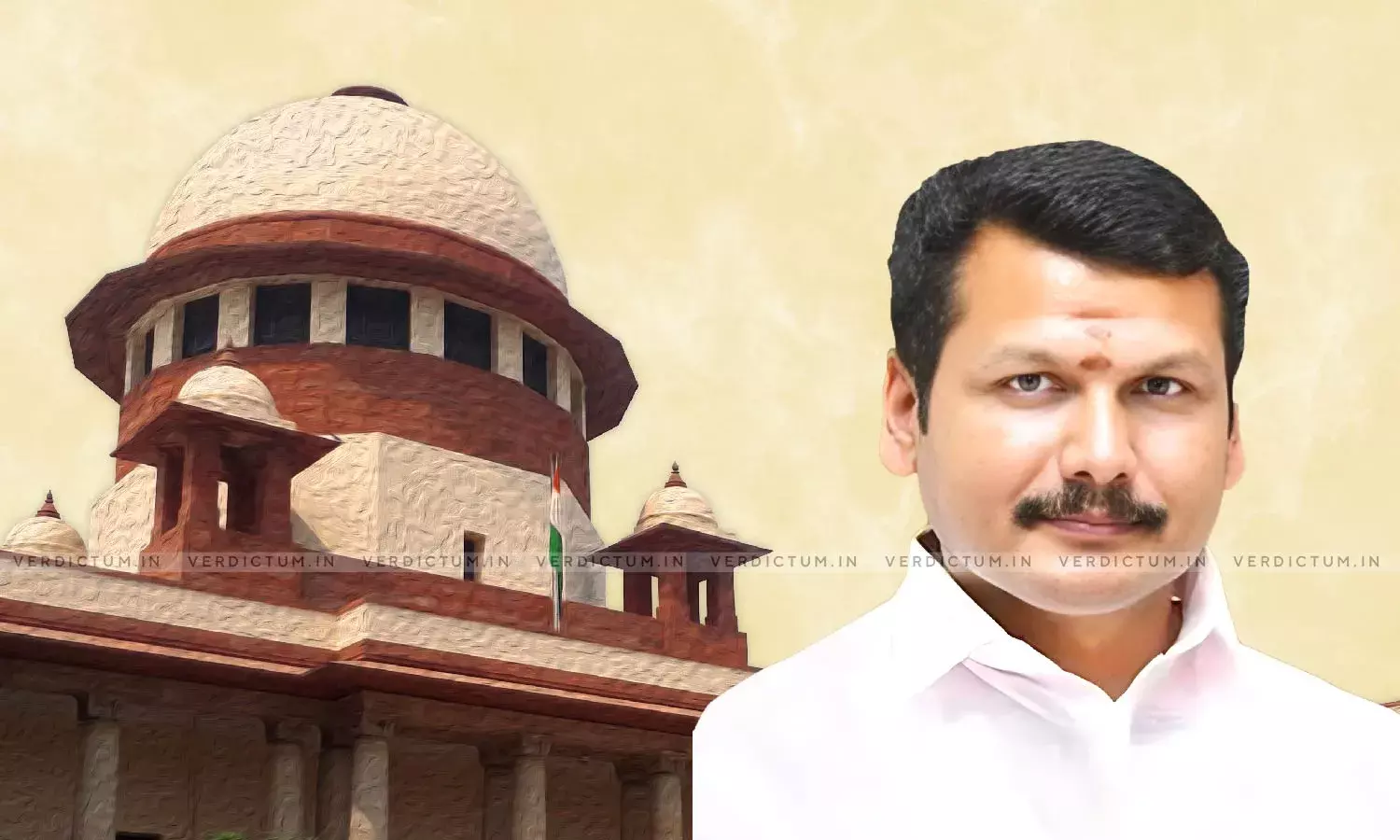Supreme Court To Hear Tomorrow Appeals By ED And Senthil Balaji Against Madras HC's Judgment About Arrest Of The Minister

The Supreme Court today agreed to hear tomorrow the Special Leave Petitions filed by V Senthil Balaji and his wife Megala challenging her husband's "illegal detention" by the Enforcement Directorate in connection with an alleged cash-for-jobs scam in the state's transport department. The SLP seeks to impugn the Madras High Court's decision, which upheld Senthil Balaji's arrest. The Court also agreed to list the Enforcement Directorate's SLP against the same judgment.
The Bench of Chief Justice D.Y. Chandrachud, Justice P.S. Narasimha and Justice Manoj Misra agreed to post the matter for consideration after Senior Advocate Kapil Sibal along with Advocate-on-Record Misha Rohatgi Mohta appearing for Senthil Balaji mentioned the matter seeking an urgent hearing.
"This item is concerning the difference of opinion in the Madras High Court and the matter then went to a third judge," submitted Sibal. He further said, "Matter will become infructuous if not heard immediately because he will be taken to police custody. Therefore we want it for tomorrow". On the other side appearing for the ED, Solicitor General Tushar Mehta said "I have also filed an SLP against the same order"
Agreeing to consider the matter, the CJI posted it for tomorrow. The CJI further asked the SG to provide a Diary Number of the SLP moved by the ED so that both matters can be heard together.
Senthil Balaji's wife had approached the Madras High Court in a Habeas Corpus Petition challenging the arrest by the ED. Earlier, the Madras High Court division bench of Justices J Nisha Banu and D Bharatha Chakravarthy had pronounced the split verdict and upon the direction of the Supreme Court, the matter was directed to be posted before a 3-Judge Bench.
Justice Banu had held that "The Writ of Habeas Corpus Petition is maintainable" and "Enforcement Directorate is not entrusted with the powers to seek police custody under the Prevention of Money Laundering Act, 2002" wherein on the other hand Justice Chakravarthy dismissed the Writ Petition.
The Chief Justice of the Madras High Court noted that since the Judges were equally divided in their opinion and had come to different conclusions, the Habeas Corpus Petition required adjudication of the issues on the points of difference by a third Judge and hence the matter was placed before a single Judge bench of a third judge who upheld the arrest of the minister. Being aggrieved by the same, the Petitioner approached the Apex Court.
The third Judge in the impugned order concurred with the view of Justice D. Bharatha Chakravarthy, that the petition though maintainable cannot be entertained after remand, and in this case can certainly not be entertained. "The Petition would be maintainable in exceptional circumstances, but this case does not attract any exceptional circumstance and consequently since an order of remand had been passed by a Court of competent jurisdiction, the relief sought in the petition cannot be granted. I would align with the view expressed by the Hon'ble Justice Mr. D. Bharatha Chakravarthy, with respect to this issue," noted the order.
In its 144 pages order, the third judge also upheld the view that the Enforcement Directorate has the power to seek custody of a person arrested.
Further on the issue of whether the Enforcement Directorate would be entitled to seek exclusion of time for the period of hospitalization beyond the first 15 days from the date of the initial remand, the judge said "I would again align with the views of the Hon'ble Justice Mr. D. Bharatha Chakravarthy, but leave it to the wisdom of the Division Bench to actually determine the first date of such custody and the days for which exclusion should be granted, since the date of that judgment was 04.07.2023 and the conditions stipulated by Hon'ble Justice Mr. D. Bharatha Chakravarthy had long since lapsed. It is for the original Division Bench to re-examine the starting date of custody. But as a finding, I would hold that exclusion of time as sought is permissible. It is the prerogative of the learned Judges to determine as to when the first date of custody would begin and the manner in which it should be granted. The concept whether the period of hospitalization can be excluded or not alone can be answered by this Court and I would answer that the period of hospitalization has to be excluded."
Also on the merits of the issue, the Judge noted "Once an arrest has been initiated and it is stated by the respondents that the detenue/accused had refused to receive the copy of the memo of arrest and also the ground of arrest but it was informed to the brother and the petitioner herein, a reasonable strong presumption can be drawn that efforts had been taken to so inform the grounds of arrest. Therefore, once arrest is legal, remand is legal. A Habeas Corpus Petition would never lie."
Bajali, the electricity and prohibition and excise minister of Tamil Nadu, was arrested on June 14 under the Prevention of Money Laundering Act (PMLA) in an alleged cash-for-jobs scam that took place when he was the transport minister in an AIADMK government led by J Jayalalithaa.
The High Court had on June 15 allowed the minister, who was then undergoing treatment at a government hospital following his arrest, to be shifted to a private facility. The High Court had said Balaji would continue to remain in judicial custody and allowed the probe agency to have its own team of doctors examine the minister.
Cause Title: Megala etc. v. The State rep. By Deputy Director, Directorate of Enforcement [SLP (Crl) No.8652-53/23]

